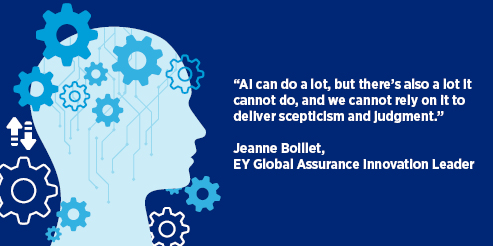The Inside Story of Accountancy & Finance in Singapore

AI IN SINGAPORE’S ACCOUNTING & FINANCE INDUSTRY IS MET WITH MIXED FEELINGS. MORE BUSINESSES ARE REALIGNING BUSINESS MODELS TO ACCOMMODATE TO TECHNOLOGICAL ADVANCEMENTS
Organisations throughout the city state brim with optimism about extended growth with seven in every ten of them foreseeing heightened business activity in the coming year (as reported in the latest 2019 Hays Asia Salary Guide). As a result, employers have been on a keen lookout for accounting and finance professionals who are able to produce commercial outcomes on top of possessing technical knowhow.
Historically, accountants in finance departments were expected to perform primarily functional roles: compiling reports, bookkeeping and the like. Yet, as the trade shifts focus towards adding commercial value, firms in Singapore are following the global trend in expecting accountants of all levels to be responsible for improving the team’s reputation within the business. The coming year will see this trend continue and firms no longer have a need for candidates who are straightforward number crunchers, instead requiring those who are able to hold dialogue with business partners on what implication those great numbers may have, and what strategy can be taken depending on their potential impact.
Candidates with a hybrid of experiences, such as both financial accounting and analysis, are highly coveted as companies move towards lean yet high-performing finance teams, where team members are expected to wear two hats in their roles. In addition, for mid-senior levels, those who can act as commercial financial managers, taking finance teams to the next level in terms of business, are being sought out, and to this end firms are widening their nets in the search, looking at individuals of broad backgrounds and skill sets.
As Accountancy & Finance in Singapore follows the global trends of increased focus on commercial aspects, it also shares concerns over the coming of automation, AI and machine learning in the sector. For accounting firms, this disruptive technology can seem something of a double-edged sword: though it makes part of the business model offered to customers obsolete, it can also provide fiscal advantages.
Singaporean firms, for the most part, understand the importance of realigning business models to accommodate this new technology, for not doing so can run the risk of becoming outmoded. They know that they must embrace cloud technology and AI to retain relevance in the market, and thus ensure their survival.

However, optimism for the coming automation is not shared by all. While firms see the technology as an opportunity to streamline operations, those who work in back office and transactional functions see the coming automation as a threat to their livelihoods, a concern that is not unfounded, with some observers predicting the loss of 30 per cent of banking jobs in the next five years to technical advances, according to Bloomberg.
As with the recent Hays DNA of a CFO (Asia) report, Srinivasan Venkita Padmanabhan, President and Global Head of Finance, Olam International, opined that business leaders, both present and future ones, should possess not only the hard skills required in a finance role but also “solid interpersonal, leadership, business understanding and organisation skills.” He also alluded that technological advancements are in the offing and said, “It could be completely different five years down the road and this is hard to predict. As such, it is important to keep abreast of trends and proactively adapt to changes.”
Yet this is easier said than done. According to an Ernst & Young survey, 79 per cent of Singapore’s finance and accountancy professionals do not feel sufficiently equipped to face the demands of their roles in ten years’ time. In order to remedy this situation, whether with their company - through study support and financial assistance for training – or with governmental assistance – such as the Skills Future initiative or the creation of new finance sector roles – candidates are urged to constantly upskill. Seeking out roles that augment rather than fight automation, developing keener soft skills and putting a greater emphasis on the aforementioned commercial aspect of the business are all ways in which candidates can become part of the new generation of accountants.
ACCOUNTING AND FINANCE PROFESSIONALS EXPECTED TO PERFORM MORE THAN THEIR PRIMARY FUNCTION; BUSINESS ACUMEN IS AN INCREASINGLY IMPORTANT SKILL SET
While accounting is still a fundamental requirement in most companies, FP&A (financial planning and analysis) professionals have been increasingly taking on an important role at management meetings as they have been expected to directly impact business performance by guiding the management team into making key decisions based on financial analyses.
Finance managers who are hands-on with the ground work (both strategically and operationally) are particularly hot in demand as they can carry out both the managerial as well as operational duties for the company. Such roles have been created to improve manpower and costs efficiencies as companies.
To add, there has been a growing conception of unique finance roles that require candidates carrying experience with data analytics-related skills such as Python and SQL. The knowledge of these technologies allows for the analysis of massive data sets and to automate processes necessary for analysis.

As hiring managers and HR departments face pressures to employ local staff, the appetite of Singapore businesses for foreign hires has been gradually diminishing, compared to previous years. MNCs or regional SMEs who do employ foreign staff are more likely to arrange for internal transfers from their global offices than to hire externally unless the role calls for extremely niche skill sets.
To cast a wider recruitment net, employers have been not only willing to consider skilled candidates without prior industry-specific experience, but they have also been investing in their current workforce. It is now common for businesses in Singapore to sponsor the professional accounting membership for their employees, on top of the annual review lessons provided for them. This serves as an incentive for employees to enhance their skill sets outside of work.
Many organisations have been ramping up their efforts in investing in their employer value propositions (EVPs) to attract the best talent in the market through professional social media networking and online content marketing. Such tactics are likely to grow each year as they prove to be effective in communicating the non-monetary benefits of working for a company.
HARD AND SOFT SKILLS IN TALENTS ARE BOTH IMPORTANT CONSIDERATIONS FOR EMPLOYERS
In Singapore, the accounting and finance sector is largely an employer’s market as there is a large supply of professionals available. As candidates face immense competition in the job market, they have been motivated to upskill through taking their ACCA/ CPA/ CFA certifications or to a smaller extent pursuing their master’s in accounting and finance. Many of them are also broadening their horizons by attending relevant networking sessions to connect with peers and prospective employers alike.
The senior candidates who will be most successful are likely to be those who not only have the requisite technical abilities but can also marry them with superior soft skills and strong stakeholder management skills, and are able to strategise the company’s vision in the business and commercial sphere.
Conclusion
While businesses are being propelled into greater heights by automation, accounting ,and finance professionals must take advantage of the opportunities presented to learn the ways to leverage new technologies and put on their commercial thinking hats on to boost not only their market value as experts but to also ensure the prosperity of businesses.
If you would like to discuss this report in more depth or you wish to discuss your job search or recruitment needs, please email Kirsty Hulston, Regional Director for Hays Singapore at Kirsty.Hulston@hays.com.sg.
The Inside Story in Singapore
Flexible Recruitment Solutions (2021)
Supply Chain & Procurement (2020)
